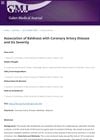 December 2022 in “International Journal of Women's Dermatology”
December 2022 in “International Journal of Women's Dermatology” The Sinclair Shedding Scale is effective for diagnosing Alopecia Areata Incognita and monitoring treatment success.
 November 2022 in “Scientific Reports”
November 2022 in “Scientific Reports” Certain ESR1 gene variations may affect hormone levels and fat distribution in women with high male hormone levels.
 October 2022 in “Research, Society and Development”
October 2022 in “Research, Society and Development” Vitamins and minerals don't significantly affect hair loss treatment in patients with telogen effluvium.
 October 2022 in “JAAD international”
October 2022 in “JAAD international” Most patients with autoimmune blistering diseases experienced some hair loss, which may be underreported and linked to disease severity.

Androgenetic alopecia, or hair loss, is caused by a mix of genetics, hormones, and environment, where testosterone affects hair growth and causes hair to become smaller and grow for a shorter time.
 May 2022 in “Journal of the Egyptian Women's Dermatologic Society (Print)”
May 2022 in “Journal of the Egyptian Women's Dermatologic Society (Print)” Women's hair loss can be due to hormonal changes and various conditions, with treatments focusing on stopping progression and managing symptoms.
 April 2022 in “Anti-cancer agents in medicinal chemistry”
April 2022 in “Anti-cancer agents in medicinal chemistry” Some existing medicines show promise as safe treatments to protect against the side effects of radiation therapy.
February 2022 in “Actas dermo-sifiliográficas/Actas dermo-sifiliográficas” Hair shaft disorders, often due to genetics or environment, lack specific treatments but can be managed with gentle hair care and may improve with age or topical treatments.
January 2022 in “Clinical Cases in Dermatology” Chemotherapy can cause significant but usually reversible hair loss, and managing it involves patient education and hair care strategies.
 December 2021 in “Revista da Sociedade Portuguesa de Dermatologia e Venereologia”
December 2021 in “Revista da Sociedade Portuguesa de Dermatologia e Venereologia” Imbalance in scalp bacteria can affect hair and scalp health, potentially leading to conditions like hair loss, psoriasis, and dandruff.
 September 2021 in “Medicina estética”
September 2021 in “Medicina estética” Sabal serrulata and biomimetic peptides with microneedling reduced hair loss and improved hair thickness in men with balding.
June 2021 in “International journal of cosmetics and dermatology” Vitamin C and E may help with certain skin and hair conditions, but more research is needed to confirm their effectiveness.

Hair loss after weight loss surgery can improve over time.
 February 2021 in “International journal of men's social and community health”
February 2021 in “International journal of men's social and community health” Online forums help understand men's concerns about baldness and show the need for better support that changes how baldness is viewed.
 January 2021 in “Turkiye Klinikleri Journal of Dermatology”
January 2021 in “Turkiye Klinikleri Journal of Dermatology” Many young men with hair loss have low levels of vitamin D and B12.
 January 2021 in “The Ochsner journal”
January 2021 in “The Ochsner journal” ADHD stimulant medications might be linked to a specific type of hair loss called Alopecia Universalis.
January 2021 in “Global Dermatology” Cellcurex™ treatment increased hair growth and thickness but caused pain and bleeding.
 October 2020 in “Galen Medical Journal”
October 2020 in “Galen Medical Journal” Baldness is linked to a higher risk of coronary artery disease, but not to its severity.
 October 2018 in “Vestnik dermatologii i venerologii”
October 2018 in “Vestnik dermatologii i venerologii” Certain growth factors affect hair loss in women and could be targeted for treatment.
 January 2018 in “Surgical and Cosmetic Dermatology”
January 2018 in “Surgical and Cosmetic Dermatology” Finasteride and dutasteride are effective for male hair loss and enlarged prostate but may cause reversible sexual side effects.
April 2023 in “Dohuk medical journal” Trichoscopy effectively differentiates Androgenetic Alopecia from Telogen Effluvium.
November 2022 in “Annals of Translational Medicine” Immune activities and specific genes are important in male pattern baldness.
 January 2022 in “Journal of Clinical and Diagnostic Research”
January 2022 in “Journal of Clinical and Diagnostic Research” Using platelet-rich plasma injections and biotin pills together significantly increases hair regrowth in men with hair loss.
January 2022 in “Springer eBooks” January 2022 in “Springer eBooks” January 2022 in “Springer eBooks”  May 2021 in “The Journal of clinical and aesthetic dermatology”
May 2021 in “The Journal of clinical and aesthetic dermatology” Most women with hair loss using 5% topical Minoxidil are satisfied with the treatment, but hair loss still affects their daily habits and social life.
January 2021 in “Medical research archives” The 5% minoxidil lotion without propylene glycol is effective, well-tolerated, and cosmetically acceptable for hair loss.


















